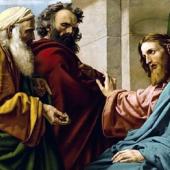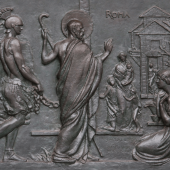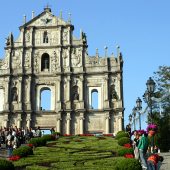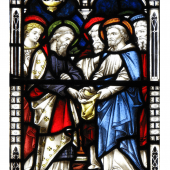The Spread of Christianity beyond Judea and Samaria
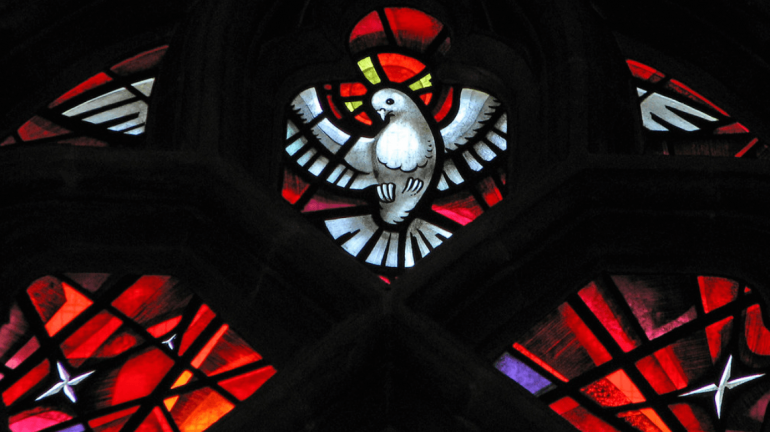
The Acts of the Apostles (Chapters 9:32-15:35)
This is the continuation of a six-part series on the Acts of the Apostles. In Part 3, Peter and the apostles spread God’s word through Judea and Samaria, and they met with remarkable success. We also witnessed the dramatic conversion of Saul and his initiation as one of the foremost apostles of Christ. In Part 4, the apostles move on further with the same mission. It can be roughly divided into two sections: Peter’s journey into Gentile territories and Paul’s first missionary journey to the countries East of Asia Minor. It concludes with the convening of the Council in Jerusalem.
This section, extending from Chapter 9 to Chapter 15, takes us on a whirlwind tour with Peter first and then with Paul. The following account records the progress of Peter’s mission in Lydda, Joppa and Ceasarea, the divine vision through which God speaks to him, and his imprisonment. The story of Paul’s first missionary journey among the Gentiles comes next, which concludes with the Council in Jerusalem.
Peter’s work among the Gentiles
Peter continued his mission in the cities of Joppa and Lydda, taking him farther away from Jerusalem. The population was mainly of Gentile origin, and every day the number of believers grew steadily, mostly inspired by the miracles Peter performed in front of their eyes.
In Lydda, Peter healed a person with paralysis called Aeneas. In Joppa, in front of a large funeral gathering, he brought back the deceased girl Tabitha to life, much to the amazement of the onlookers. The events persuaded many to accept the faith and Peter continued to preach God’s Word to the Gentiles.
Peter’s vision
Throughout his missionary journeys, the Holy Spirit was in close communication with Peter. Sometimes, when Peter needed divine direction, it came in the form of visions. One day, Peter fell into a trance and saw the heavens open in front of him. A sheet full of animals and reptiles was being lowered, and he heard God’s voice asking him to kill and eat any of the animals he saw. Having been brought up in strict Jewish traditions, which prescribed several dietary restrictions, Peter was horrified at the suggestion. But again, the Lord spoke to him,
“Do not call anything impure that God has made clean” (Acts 10:15).
This divine instruction to Peter had two connotations. First, it signified the shattering of age-old Jewish traditions that had spread like a parasitic plant on the main stem of the relationship between God and man.
Just as God had discarded the custom of circumcision by sending His Spirit on the uncircumcised Gentiles, this was another deeply rooted practice that was pushed aside through this vision. We recall in Luke 11 how Jesus Christ had let fly against the rituals and customs that the Jews followed to the letter, even as they completely ignored the values of true justice and love of God. The Holy Spirit educated Peter to focus on outcomes and not get distracted by religious practices disconnected from one’s true relationship with the Creator.
The second connotation was relevant to the immediate context. Peter was himself so profoundly rooted in the cultural milieu of the Jews that it was important for him to be convinced of the equality that God wished to accord between the Jew and Gentile believers.
Fresh from his experience at Samaria, where the Holy Spirit had anointed all the Gentile believers, Peter had grown to understand these changed beliefs better. But it was the vision that finally convinced him that God did not acknowledge the man-made differences between different cultures, nations and religions. The only thing that mattered was true faith and allegiance to God.
The vision of Cornelius
In parallel to Peter’s vision, Cornelius, the Centurion, saw an angel of the Lord in a vision. The angel acknowledged all his charitable works and asked him to invite Peter to his home. Peter went immediately, refreshed with the new revelations he had received through the vision. He spoke convincingly about how God does not recognize or acknowledge man-made differences between races and cultures. He accepts all those who follow His Way. There is no other yardstick by which humans are measured.
As Peter continued his discourse describing the life, death and resurrection of Jesus, the Holy Spirit came down powerfully among the Gentiles gathered at the house of Cornelius, and all of them began to speak in tongues and praise God. The circumcised Jews who were present were astonished to see this. The writing was on the wall. Circumcision was no longer a mark of God’s favor. Christian doctrine was parting ways from its Jewish antecedents.
Peter’s escape from prison
Meanwhile, the church continued to grow in Phoenicia, Cyprus and Antioch. Barnabas was sent to Antioch to give impetus to the movement that brought so many Greeks to the Lord. He took Saul with him and continued their excellent work there. It is at Antioch that the believers were first called Christians.
The ministry of the apostles was subject to terrible persecutions under the orders of King Herod. James, the apostle, was put to death, and his next victim was Peter. Herod threw him into prison, bound him with chains and ensured he was closely guarded. On the night before his trial, an angel came and released him, guided him through the squad of guards and let him out of the city gates. He joined a group of believers and told them of his miraculous escape.
From this point on, Peter’s role recedes to the background, and Paul takes the baton from him to run the next lap of the race.
Paul’s first missionary journey
Prompted by the Holy Spirit, Paul and Barnabas set sail for Cyprus and Mark, who came along as their helper. One can imagine that it must have been difficult for them to find an audience for what they had to say as they stepped onto strange shores. But Paul had a strategy. He headed straight for the Jewish synagogues, speaking to the Jews. It is only then that he preached to the Gentiles.
In Cyprus
Before we follow Paul on his missionary journey, it may be beneficial to understand the culture and customs of the pagans he wanted to address. In Cyprus, people worshipped the Greek Goddess Aphrodite. The neighboring cities of Paphos and Salamis were full of her devotees, and their festivals celebrated her sensuality and illicit relationships. In Paphos, magicians were highly regarded, and Elymas, the sorcerer, was an attendant to the proconsul, Sergius Paulus. When Paul and Barnabas were invited to his court, Elymas was on tenderhooks and tried to influence the proconsul against the apostles. Filled with the Holy Spirit, Paul cursed the sorcerer with blindness, and he could see no more. When the proconsul saw what happened, he became a believer.
In Pisidian Antioch (Phrygia)
Antioch was under the direct control of the Romans, and all allegiance, religious and otherwise, was dedicated to its Emperor Augustus. However, the Jews were allowed to have their synagogues and customary religious practices. As soon as Paul and Barnabas arrived there, they decided to go to the synagogue on the Sabbath. On being invited to address the gathering of Jews and Gentiles, Paul took the stage. Like Peter, he too began with the events recorded in the Old Testament, from Moses to David and then to Jesus Christ, His Passion, Death and Resurrection. Then he came to the crux of his message— “Therefore, my friends, I want you to know that through Jesus the forgiveness of sins is proclaimed to you. Through him everyone who believes is set free from every sin, a justification you were not able to obtain under the law of Moses.”-Acts 13:38-39
Paul’s words impacted his audience in different ways. The Gentiles and other Jewish believers were captivated by his revelations and invited him to address them again the next Sabbath. The Jews, on the contrary, became very unhappy. Paul had just proclaimed the redemption that was achieved through Christ, which was beyond what the law of Moses could achieve. Not only were they being equated with the pagans, but their law was also being depreciated.
The synagogue was filled with people the following Sabbath, mostly with believers and Gentiles. The Jews wanted to put a stop to their popularity and threatened the apostles with persecution. Paul and Barnabus left for Iconium.
In Galatia
Paul preached in Iconium, Lystra and Derbe in the region of Galatia. The people there indulged in the cult worship of Greek and Roman Gods like Zeus, Heracles and Cybele. It was challenging to convince them of the folly of idol worship. Paul performed a miracle by healing a lame man, making the pagans look at them as personifications of their Gods. Added to this, the Jews were out to persecute them. Finally, they stoned Paul and dragged him outside the city, leaving him to die. But his disciples rescued him.
Undaunted, the apostles continued their journey to other places in South Galatia. They appointed elders to look after the churches they had initiated in these provinces. In spite of the heavy opposition they faced, the believers grew in number, and the churches progressed under the guidance of the elders appointed by Paul and Barnabas.
The question of circumcision
Old traditions die hard, and this was proved when people from Jerusalem visited the newly baptized Christians and insisted that they could not be saved unless they were circumcised. Paul and Barnabas opposed them vehemently. Finally, they decided to meet in Council in Jerusalem and settle the matter once and for all in the presence of the apostles and elders.
Peter addressed the gathering, pointing out that the Gentiles should be spared circumcision. God himself had anointed them with the Holy Spirit, indicating His divine will in the matter. Paul and Barnabas also supported this view. James concluded the discussion by ratifying the decision on doing away with circumcision and adding a few clauses regarding food offered to idols and sexual immorality that Gentile believers were expected to adhere to. A letter to this effect was formally composed by the Council and sent to all the newly formed churches. The message was accepted with gladness wherever it was read.
A journey of joy and suffering
The missionary journeys of Peter and Paul laid the foundation for the practice of Christianity across the world. Christianity was born, acknowledging the path from Abraham to Jesus, but proclaiming a religion of faith, love and redemption through Christ beyond the Jewish Law. Once and for all, it set aside the manmade rules and regulations that governed Jewish tradition. It sought allegiance to the crucified Messiah through whom the whole of humanity attained salvation.
The task the two apostles undertook was no mean one. Moving from one pagan province to another, they won over believers who had to detach themselves from idol worship and licentious lifestyles. The Jews were out to persecute them. Peter was imprisoned but escaped with the help of an angel of God. Paul was nearly stoned to death. But the Holy Spirit was there, a constant companion and guide, saving them from difficult situations and empowering them to spread the Word further.
The organizational structure of this growing community further improved as the apostles chose elders to take care of the churches in the different provinces they had visited. For the first time, we also hear of the Council of apostles and elders who came together to formally ratify and record the norms to be approved or discarded. The Catholic organizational structure broadly remains the same even today. Catholics recognize the Council and the Synod as authoritative decision-making bodies whose diktats are respected and followed by the churches under them.
As we follow the footsteps of these great evangelists, there is much to be learnt, much to be emulated from them. They became strong and fearless in the face of persecution and suffering. They knew what sacrifices they would be called to make. They reach out to us over the distance of time and space to tell us -“We must endure many hardships to enter the kingdom of God” (Acts 14:22). May we always be ready to take up our cross and follow Him.
Check out the entire series on the Acts of the Apostles
- Part 1 - Acts of the Apostles: Unique Reflections
- Part 2 – How did Christianity Spread after Ascension?
- Part 3 – The Work of the Holy Spirit beyond Jerusalem
- Part 4 – The Spread of Christianity beyond Judea and Samaria
- Part 5 - Paul’s mission in Europe and Asia
- Part 6 - Moving To the Ends of the Earth
Radio Veritas Asia (RVA), a media platform of the Catholic Church, aims to share Christ. RVA started in 1969 as a continental Catholic radio station to serve Asian countries in their respective local language, thus earning the tag “the Voice of Asian Christianity.” Responding to the emerging context, RVA embraced media platforms to connect with the global Asian audience via its 21 language websites and various social media platforms.









